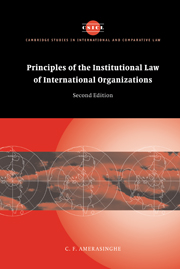Book contents
- Frontmatter
- Contents
- Preface
- List of abbreviations
- Table of cases
- 1 Introduction
- 2 Interpretation of texts
- 3 Legal personality
- 4 Membership and representation
- 5 Non-Judicial organs of organizations
- 6 Acts of non-judicial organs: their legal effect
- 7 Acts of non-judicial organs: the doctrine of ultra vires
- 8 Judicial organs
- 9 The internal law: employment relations
- 10 Privileges and immunities
- 11 Financing
- 12 Responsibility to and of international organizations
- 13 The liability of member states vis-à-vis third parties
- 14 Amendment of constitutions
- 15 Dissolution and succession
- 16 The settlement of disputes
- Index
- Cambridge Studies in International and Comparative Law
3 - Legal personality
Published online by Cambridge University Press: 10 December 2009
- Frontmatter
- Contents
- Preface
- List of abbreviations
- Table of cases
- 1 Introduction
- 2 Interpretation of texts
- 3 Legal personality
- 4 Membership and representation
- 5 Non-Judicial organs of organizations
- 6 Acts of non-judicial organs: their legal effect
- 7 Acts of non-judicial organs: the doctrine of ultra vires
- 8 Judicial organs
- 9 The internal law: employment relations
- 10 Privileges and immunities
- 11 Financing
- 12 Responsibility to and of international organizations
- 13 The liability of member states vis-à-vis third parties
- 14 Amendment of constitutions
- 15 Dissolution and succession
- 16 The settlement of disputes
- Index
- Cambridge Studies in International and Comparative Law
Summary
The status on the international and non-international plane of international organizations has for some time been fertile ground for text writers, though there have been few international judicial decisions which have faced the subject directly or indirectly. The debate mainly concerns two issues:
(i) Do international organizations have legal personality and when and how do they acquire it?
(ii) What are the consequences of the attribution of legal personality?
As noted in Chapter 1, international bodies created by treaty emerged at the beginning of the nineteenth century. The first international body created by states was perhaps the Administration général de l'octroi de navigation du Rhin which was established by the Treaty of 15 August 1804 between France and the Holy Roman Empire, which was a closed organization. There were many more such closed organizations, but late in the nineteenth century a few organizations which were later to become open international organizations (e.g., the UPU (1874)) came into existence. It was not until the creation after the First World War of the League of Nations and the International Labor Organization which were open organizations that the issue of the legal personality of international organizations came seriously to be discussed. Perhaps the earliest attempts to discuss the issue were by text writers, such as Anzilloti, but these were rudimentary. There was much controversy on the issue in writings before the Second World War, the tendency being to concentrate on the personality of international organizations in national law and to concede that the League of Nations had a special status which gave it international personality but to deny that other organizations whether open or closed had such personality.
- Type
- Chapter
- Information
- Publisher: Cambridge University PressPrint publication year: 2005



